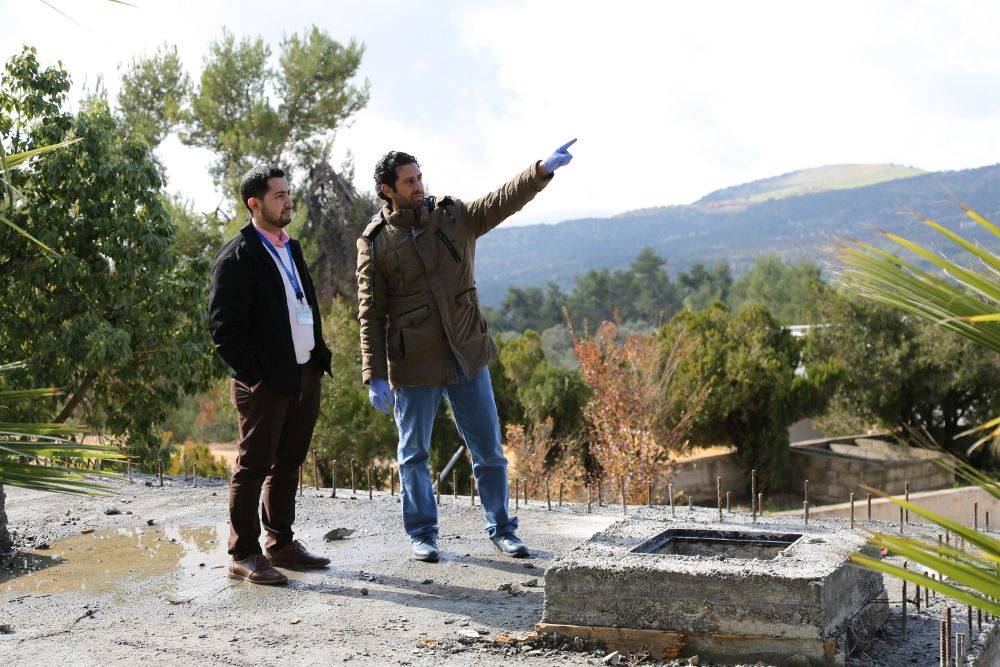We use Cookies. Read our Terms
- News
- Under pressure: Infrastructure in Jordan and Lebanon
Under pressure: Infrastructure in Jordan and Lebanon

Photo: UNDP
The spillover effects of the Syria crisis affect the entire sub-region. Collaboration between OFID and UNDP has been helping to repair, establish and improve some essential basic infrastructure. Two successful initiatives are considered below.
The water crisis in Jordan is not a recent phenomenon, but it has been aggravated by the impact of the Syria crisis,” says Salameh Mahasneh from Jordan’s Ministry of Water and Irrigation.
Social cohesion in Jordan and other parts of the Middle East is under pressure from new local dynamics following the massive and well-documented movement of refugees. In an attempt to strengthen the resilience of the host communities most affected by the Syria crisis, OFID and the United Nations Development Programme (UNDP) have been working together to provide innovative and sustainable water solutions.
Salameh Mahasneh from Jordan’s Ministry of Water and Irrigation explains how the efforts of the two organizations – which have included installing rainwater harvesting and greywater systems in Jordan – have benefited around 60,000 people. The project focused on 38 public buildings in the state, recognizing their important role in bringing and keeping communities together – including Syrian inhabitants. Schools, which have been under severe stress (with staff often having to resort to double shifts to cope with inflated numbers to provide for both Jordanian and Syrian students) were also included in the initiative.
The Ajloun University College, with around 3,000 students, is just one of the schools that benefited. In addition to receiving a water harvesting system, technology has been installed to collect and filter wastewater from washbasins and reuse it for cleaning purposes. “Through these interventions, we can address the short-term needs of local communities while strengthening the long-term sustainability of water use,” says Mahasneh.
The strong partnerships established with local communities and organizations by UNDP – with OFID’s support – have helped local people take full ownership of the initiative. Working with three non-governmental organizations in particular – namely the Royal Society for the Conservation of Nature, the Royal Scientific Society, and Future Pioneers for Empowering Communities – all of which have robust links to local communities contributed in no small part to the project’s success.
Project activities went beyond the installation of water solutions. Awareness raising sessions were organized in schools and with local organizations and people learned how to make more efficient use of water in their everyday lives. People were also familiarized with water-efficient hygiene practices and provided with information about household water harvesting and grey water systems.
Given the chronic water scarcity in Jordan, educating children to use water more efficiently is vital. Many have called for similar awareness raising campaigns to be made part of the school curricula, not just a component of development projects.
To help the project’s sustainability, UNDP developed a ‘water toolkit’ that addresses challenges and best practices that emerged throughout the project. The toolkit will be distributed to academic institutions, civil society organizations, local communities and individuals to further promote sustainable water use and the installation of additional water solutions across the country.
Landfill in Lebanon
As part of its broader regional support since 2011, OFID has extended financial assistance to UNDP in its ongoing response to manage municipal solid waste in Lebanon, a neighboring country that currently hosts around 1.5 million Syrians.
Ghazzeh, a village in Lebanon’s Bekaa Valley, was home to 6,000 people prior to the outbreak of the Syria crisis. Over the past years, it has hosted more than 30,000 displaced people fleeing violence and conflict.
The pressure on Ghazzeh has been significant, putting a strain on services and the labor market. “We found ourselves in the eye of the crisis,” says Mohammad Al Majzoub, Head of the Ghazzeh Municipality. “We struggle every day to address the growing challenges.”
Just a year ago, due to the absence of functioning municipal solid waste management facilities and the increased waste produced by the growing population, an open unsanitary dumpsite posed numerous environmental and health threats to Ghazzeh and its inhabitants.
The UNDP intervention – supported by OFID – focused on the rehabilitation of the dumpsite by constructing a sanitary landfill for existing and future waste. The first sanitary cell of the landfill has been already filled and closed, while the second should meet the waste disposal needs of Ghazzeh for the coming years. The project also included an awareness raising campaign about waste reduction and sorting for recycling and reuse as well as the supply and distribution of bins. The construction of the landfill has also created work opportunities. “
Although the crisis is still unfolding, we need to be forward-looking and start from now to build a better future for the population of Ghazzeh, irrespective of whether they are Lebanese citizens or refugees,” said Al Majzoub.